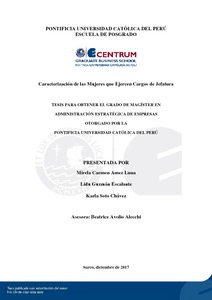| dc.contributor.advisor | Avolio Alecchi, Beatrice Elcira | |
| dc.contributor.author | Amez Luna, Mírela Carmen | es_ES |
| dc.contributor.author | Guzmán Escalante, Lidu | es_ES |
| dc.contributor.author | Soto Chávez, Karla | es_ES |
| dc.date.accessioned | 2018-01-31T22:12:07Z | |
| dc.date.available | 2018-01-31T22:12:07Z | |
| dc.date.created | 2017 | |
| dc.date.issued | 2018-01-31 | |
| dc.identifier.uri | http://hdl.handle.net/20.500.12404/9977 | |
| dc.description.abstract | El propósito general de esta investigación fue identificar las características de las mujeres que
ejercen cargos de jefatura en Lima Metropolitana. El estudio se desarrolló de manera no
experimental, donde los investigadores observaron la manifestación de las variables de los
sujetos en su contexto natural. Es una investigación con enfoque descriptivo y con
metodología cualitativa, desarrollada a través del estudio de caso múltiple con el fin de
ahondar en el estudio de cada caso de forma individual. Los resultados de la investigación
permitieron concluir que las mujeres que ejercen cargos de jefatura comparten las siguientes
habilidades: (a) capacidad técnica o conocimientos; (b) habilidad para motivar a la gente; (c)
orientación a los objetivos o proyectos; (d) saber en qué momento actuar, cuándo no hacer
nada y cuándo hacerlo todo, o cuándo solo una parte; (e) capacidad para decidir cuál es la
persona correcta en quien apoyarse; (f) capacidad para tomar decisiones, y (g) carácter. Esto
se complementa con la habilidad para delegar, principalmente las tareas rutinarias u
operativas, mientras que aquellas actividades que agregan valor son realizadas di
directamente por la jefa. En la mayoría de los casos, resulta esencial que las mujeres jefas
alineen sus objetivos personales con los de la organización, lo cual favorece el desarrollo de
sus carreras profesionales. Así mismo, el uso de un estilo de liderazgo democrático o
participativo es predominante, promoviendo la participación y la comunicación con el equipo
de trabajo; aunque indicaron que no es posible adoptar el mismo tipo de liderazgo en todas
las ocasiones, ya que depende de las circunstancias y del tiempo disponible. Otra
característica esencial en las mujeres que ejercen cargos de jefaturas es manejar
adecuadamente las emociones, así como construir alianzas en los centros de trabajo, las
cuales deben estar soportadas en los méritos profesionales y no en la amistad. La principal
barrera que se encontró para el desarrollo de las mujeres jefas es que constantemente deben
estar demostrando su capacidad como profesionales y líderes | es_ES |
| dc.description.abstract | The general purpose of this research was to identify the characteristics of women who hold
leadership positions in Metropolitan Lima. The study was developed in a non-experimental
way, where the researchers observed the manifestation of the variables of the subjects in their
natural context. It is a research with a descriptive approach and qualitative methodology,
developed through the multiple case study in order to delve into the study of each case
individually. The results of the investigation allowed us to conclude that the women who hold
leadership positions share the following skills: (a) technical capacity or knowledge; (b) ability
to motivate people; (c) orientation to the objectives or projects; (d) know when to act, when
not to do anything and when to do everything, or when only a part; (e) ability to decide which
is the right person to rely on; (f) ability to make decisions, and (g) character. This is
complemented by the ability to delegate, mainly routine or operational tasks, while those
activities that add value are made directly by the boss. In most cases, it is essential that
women leaders align their personal objectives with those of the organization, which favors
the development of their professional careers. Likewise, the use of a democratic or
participative leadership style is predominant, promoting participation and communication
with the work team; although they indicated that it is not possible to adopt the same type of
leadership at all times, since it depends on the circumstances and the time available. Another
essential characteristic in women who hold leadership positions is to adequately handle
emotions, as well as build alliances in the workplace, which must be supported in
professional merit and not in friendship. The main barrier that has been found for the
development of female leaders is that they must constantly demonstrate their capacity as
professionals and leaders | es_ES |
| dc.language.iso | spa | es_ES |
| dc.publisher | Pontificia Universidad Católica del Perú | es_ES |
| dc.rights | info:eu-repo/semantics/openAccess | es_ES |
| dc.rights.uri | http://creativecommons.org/licenses/by-nc-nd/2.5/pe/ | * |
| dc.subject | Mujeres ejecutivas -- Perú | es_ES |
| dc.subject | Liderazgo | es_ES |
| dc.subject | Investigación cualitativa | es_ES |
| dc.title | Caracterización de las mujeres que ejercen cargos de jefatura | es_ES |
| dc.type | info:eu-repo/semantics/masterThesis | es_ES |
| thesis.degree.name | Magíster en Administración Estratégica de Empresas | es_ES |
| thesis.degree.level | Maestría | es_ES |
| thesis.degree.grantor | Pontificia Universidad Católica del Perú. CENTRUM | es_ES |
| thesis.degree.discipline | Administración Estratégica de Empresas | es_ES |
| renati.discipline | 413307 | es_ES |
| renati.level | https://purl.org/pe-repo/renati/level#maestro | es_ES |
| renati.type | https://purl.org/pe-repo/renati/type#tesis | es_ES |
| dc.publisher.country | PE | es_ES |
| dc.subject.ocde | https://purl.org/pe-repo/ocde/ford#5.02.04 | es_ES |






